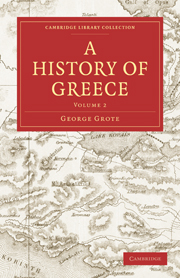Book contents
- Frontmatter
- Contents
- PART I CONTINUATION OF LEGENDARY GREECE
- CHAPTER XVIII Closing events of Legendary Greece.—Period of intermediate darkness, before the dawn of Historical Greece
- CHAPTER XIX Application of Chronology to Grecian Legend
- CHAPTER XX State of Society and Manners as exhibited in Grecian Legend
- CHAPTER XXI Grecian Epic.—Homeric Poems
- PART II HISTORICAL GREECE
- Plate section
CHAPTER XVIII - Closing events of Legendary Greece.—Period of intermediate darkness, before the dawn of Historical Greece
Published online by Cambridge University Press: 29 August 2010
- Frontmatter
- Contents
- PART I CONTINUATION OF LEGENDARY GREECE
- CHAPTER XVIII Closing events of Legendary Greece.—Period of intermediate darkness, before the dawn of Historical Greece
- CHAPTER XIX Application of Chronology to Grecian Legend
- CHAPTER XX State of Society and Manners as exhibited in Grecian Legend
- CHAPTER XXI Grecian Epic.—Homeric Poems
- PART II HISTORICAL GREECE
- Plate section
Summary
SECTION I.—RETURN OF THE HERAKLEIDS INTO PELOPONNESUS
In one of the preceding chapters, we have traced the descending series of the two most distinguished mythical families in Peloponnêsus—the Perseids and the Pelopids: we have followed the former down to Hêraklês and his son Hyllus, and the latter down to Orestês son of Agamemnôn, who is left in possession of that ascendency in the peninsula which had procured for his father the chief command in the Trojan war. The Herakleids or sons of Hêraklês, on the other hand, are expelled fugitives, dependent upon foreign aid or protection: Hyllus had perished in single combat with Echemus of Tegea, (connected with the Pelopids by marriage with Timandra sister of Clytæmnêstra,) and a solemn compact had been made, as the preliminary condition of this duel, that no similar attempt at an invasion of the peninsula should be undertaken by his family for the space of 100 years. At the end of the stipulated period the attempt was renewed, and with complete success; but its success was owing not so much to the valour of the invaders as to a powerful body of new allies. The Herakleids re-appear as leaders and companions of the Dorians,—a northerly section of the Greek name, who now first come into importance,—poor indeed in mythical renown, since they are never noticed in the Iliad, and only once casually mentioned in the Odyssey, as a fraction among the many-tongued inhabitants of Crête—but destined to form one of the grand and predominant elements throughout all the career of historical Hellas.
- Type
- Chapter
- Information
- A History of Greece , pp. 1 - 46Publisher: Cambridge University PressPrint publication year: 2010First published in: 1846

